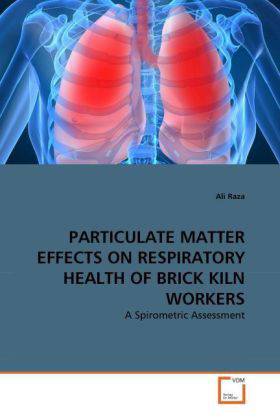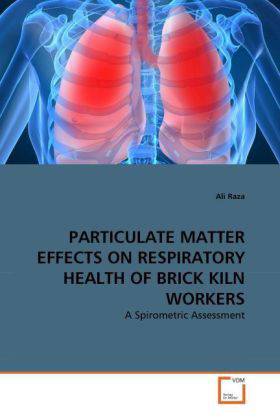
Door een staking bij bpost kan je online bestelling op dit moment iets langer onderweg zijn dan voorzien. Dringend iets nodig? Onze winkels ontvangen jou met open armen!
- Afhalen na 1 uur in een winkel met voorraad
- Gratis thuislevering in België vanaf € 30
- Ruim aanbod met 7 miljoen producten
Door een staking bij bpost kan je online bestelling op dit moment iets langer onderweg zijn dan voorzien. Dringend iets nodig? Onze winkels ontvangen jou met open armen!
- Afhalen na 1 uur in een winkel met voorraad
- Gratis thuislevering in België vanaf € 30
- Ruim aanbod met 7 miljoen producten
Zoeken
€ 48,45
+ 96 punten
Omschrijving
Among air pollutants, particulate matter (PM) is one of the well known causes of respiratory diseases in human all over the world and has become a major problem of developing countries of South Asia such as Pakistan. A research based survey was conducted to find out PM effects on respiratory health of brick kiln workers in Jalalpur Jattan, Gujrat, Pakistan. Lung function of 156 workers employed in brick kilns, using spirometer by recording FVC, FEV1 and FEV1%, was examined during working hours. FVC and FEV1 were significantly lower than predicted for brick kiln workers and suggested a restrictive pattern. Average concentrations of both PM2.5 and PM10 in ambient air of each section of brick kilns, monitored by dust tracker, were above the NEQS standard values which can cause pulmonary diseases. There was a high prevalence of respiratory disease symptoms such as difficult breathing, chest pain and cough with sputum etc. found in brick kiln workers. Also high prevalence was noted for eye irritation, nasal congestion, fatigue and skin allergy etc. These findings of lung function decline in brick workers may suggest prevalence of occupational lung diseases.
Specificaties
Betrokkenen
- Auteur(s):
- Uitgeverij:
Inhoud
- Aantal bladzijden:
- 76
- Taal:
- Engels
Eigenschappen
- Productcode (EAN):
- 9783639342550
- Verschijningsdatum:
- 19/04/2011
- Uitvoering:
- Paperback
- Formaat:
- Trade paperback (VS)
- Afmetingen:
- 152 mm x 229 mm
- Gewicht:
- 122 g

Alleen bij Standaard Boekhandel
+ 96 punten op je klantenkaart van Standaard Boekhandel
Beoordelingen
We publiceren alleen reviews die voldoen aan de voorwaarden voor reviews. Bekijk onze voorwaarden voor reviews.











